Posts Tagged ‘English PEN’
PEN Journey 46: Wrapping Up
PEN International celebrates its Centenary in 2021. I’ve been active in PEN for more than 30 years in various positions and now as an International Vice President Emeritus. With memories stirring and file drawers of documents and correspondence bulging, I am a bit of a walking archive and have been asked by PEN International to write down memories. I hope this personal PEN journey will be of interest.
I finished my term as International Secretary of PEN July 2007 at PEN’s 73rd World Congress in Dakar, Senegal. I handed over the responsibility to my longtime colleague Eugene Schoulgin (Norwegian PEN) who would continue to work with the Board, the Executive Director Caroline McCormick, new Treasurer Eric Lax and President Jiří Gruša. We had executed many changes in the last three years, and those who had been involved were continuing and active both in the international leadership and in the PEN centers.
Before the Congress, the staff and PEN members gave me a farewell party at PEN International’s relatively new London headquarters on High Holborn. PEN is about people, and I’d been fortunate to work over many decades with dozens of talented writers who were also competent in organizational work, friends from around the globe who remain friends today.
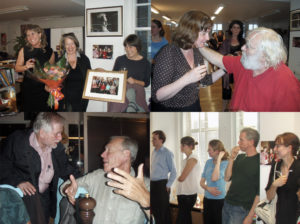
PEN International Farewell gathering in London 2007 with friends and staff, including Caroline McCormick, Joanne Leedom-Ackerman, Jane Spender, Sara Whyatt, Moris Farhi, Peter Firkin, Eugene Schoulgin, Frank Geary, Emily Bromfield, Mitch Albert, Mandy Garner.
As a Vice President, I would continue to work, write appeal letters to governments for the Writers in Prison Committee (WiPC)’s RAN (Rapid Action Network) cases, speak when asked and hold meetings in Washington when asked, but I could return to being a writer. American PEN’s Executive Director Michael Roberts asked me to join American PEN’s board. I demurred and said I needed a break, but he and others urged me so in 2008 I joined the board of PEN America but worked at a far less intense pace for the next six years. When American PEN’s new Executive Director Suzanne Nossel came on, I was asked to extend for an additional year as a Vice President while she oriented to PEN’s international work. It is difficult to step away from PEN though most who are engaged find they must for a time, though not too far away.
As I left the historic Senegal Congress that July 2007, I boarded a plane and flew out over the Atlantic to Italy where I met up with my husband by a lake in one of our favorite spots for a vacation. He had patiently waited those three years as I spent 10-15 days a month on the road. In the first week without PEN’s emails and phone calls and conferences, we talked; I wrote, and I read four books in six days.
Back home I soon realized I needed to join the 21st century as a writer. At PEN we had begun to use some tools of social media in publicizing cases of writers under threat, but I hadn’t engaged personally. I remember sitting with a group of women writers in Washington, DC, many younger than me, who were talking about their websites and blogs and Twitter, and Facebook. In 2007 writers having URLs, Twitter handles, Facebook pages was relatively new. Twitter had only launched the year before, and though blogs had been around for a few years, I had never written one. Facebook seemed an odd medium, also only a few years old. I was of the “private” generation; we were not prone to sharing our activities and feelings on a “social” platform. Those of us who’d been journalists were used to having to condense stories, but never to 140 characters which Twitter demanded. We were in a new communications age, and I needed to understand and at least to put a toe in the water, even if I didn’t jump fully in.
Encouraged by friends and agent, I set up a website. The developer urged me to blog. I didn’t want to blog, I explained. I wanted to write fiction and occasional journalism, but I agreed to post a blog once a month. I have done so for over ten years now. Often when I considered what was worth writing about each month, I found myself reflecting on work with PEN. When asked to write about PEN’s history as I’d witnessed it in anticipation of the Centennial, I reasoned I could post twice a month. That seemed a reasonable way to get through PEN’s history year by year. A serial blog. I have sped up the pace since Covid locked us all into our homes and travel has halted. I have now come to an end of this particular PEN Journey though I will write an introduction. I will also reference links to those blog posts I wrote after 2007 when I continued to work with PEN.
In this final post, I want to review a few areas of PEN International I feel I haven’t explored sufficiently, and I want to give a quick view forward of what and who came next.
In Journey’s 7, 8, 22, 25, 26, I touched on the work of the PEN Emergency Fund. I want to highlight that here. Founded in 1971 by Dutch Writer A. (Bob) den Doolaard who had an active role with PEN International, the PEN Emergency Fund fulfilled a missing link in PEN’s work. Doolaard noted that PEN had no mechanism to grant material aid to writers, especially those under threat who had to flee their countries so he and Dutch PEN set up the aid fund based in the Netherlands, operated under Dutch law. The PEN Emergency Fund gives a one-time grant to writers in dire circumstances and is able to act quickly. Over the years PEN’s Emergency Fund has provided rapid support for writers on every continent, especially those in Eastern Europe during the Communist era and those in the Balkans War in the 1990s and also to persecuted writers in Asia, Africa and Latin America. Every year dozens of writers have been helped with grants that have bridged to longer term answers. The Fund operates in close collaboration with PEN International whose professionals furnish the Fund with information and with the PEN centers and members who have contributed to the Fund. I’ve had the privilege of serving on the PEN Emergency Fund Advisory Board for a number of years.
Prizes: As a literary organization, PEN through its centers awards numbers of literary awards, but only a few literary prizes have been awarded by PEN International. Over the years the idea of a PEN International Prize for Literature or even for Peace has arisen. When I first took on the position of International Secretary, we were approached by a donor offering to give PEN $100,000 for the PEN International Prize for Peace. Well-meaning though the donor was, it quickly became clear that PEN International could not accept. The donor already had his first winner in mind—Bono. We explained that any prize would have to be independently judged with established criteria and nominating processes, and in order for PEN to give an annual prize, we would need to have a substantial financial commitment in an account to assure we could afford the prize each year as well as the cost of the judging and ceremony. We named the figure. The discussions broke off though the donor, I think, did find another way to give his prize though not through PEN.
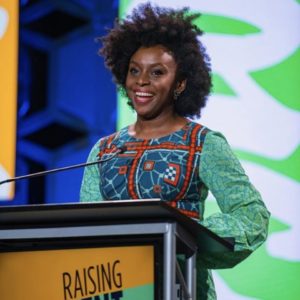
Chimamanda Adichie, PEN David T. Wong International Short Story Prize winner.
The biennial PEN David T. Wong International Short Story Prize did come into being for a time, with a much more modest monetary award for a new writer, open to nominations by all PEN Centers and run by International PEN Foundation’s Gilly Vincent, who later became General Secretary of English PEN. Gilly was a pro and lined up well-qualified writers as judges. The nominations came in from PEN Centers around the world and the winner was often celebrated at PEN’s Congress. One of the first winners for 2002-2003 was a young Nigerian writer Chimamanda Adichie, who won for her short story “One Half of the Yellow Sun,” submitted by her local PEN Center USA West. The story went on to become the celebrated novel by the same name, and she went on to win wide international acclaim for that and other books. The PEN David T. Wong Prize was one of the first international recognition of her as a writer. The judges for 2003 were William Trevor, Michele Roberts and J.M. Coetzee who won the Nobel Prize for Literature later that year. The 2001 prize had been won by Rachel Seifert, who went on to have her first novel short-listed for Booker Prize.
PEN International’s Writers in Prison Committee, the PEN Emergency Fund and Oxfam Novib each year do give the Oxfam Novib/PEN International Free Expression Award to writers who work for freedom of expression in the face of persecution. The award is given to writers and journalists committed to free speech despite the danger to their own lives.
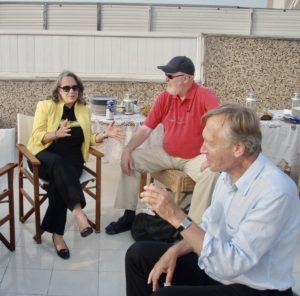
Turkey visit—on the roof with Joanne Leedom-Ackerman, Carl Morten and Eugene Schoulgin (Norwegian PEN)
Many other literary awards and literary festivals are hosted by PEN’s centers around the world. I had the pleasure of visiting a number of those, including in Croatia and in Turkey, hosted by the PEN centers.
There are many aspects of PEN’s work I’ve touched on but not explored fully such as the formation of a PEN center, which technically can occur when 20 reputable writers get together and petition the International office. There is a limit of five centers per country; most countries have fewer, and many countries have only one center. The rationale for additional centers has been to reflect linguistic diversity in a country. For instance, Switzerland has French, German, Italian, and Esperanto centers, or to facilitate participation when the land mass is large. The U.S. used to have two centers, one based in New York and one in Los Angeles, but in the past years, the two centers have merged into one PEN America. In Canada where there is both large land mass and diverse languages PEN has two centers—PEN Canada based in Toronto essentially uses English as the primary language and Quebecois PEN uses French. In some countries there are many, many languages as in India, which also has a large landscape and has the All-India Center in Bombay and the PEN Delhi Center. The rationale depends largely on the ambition and needs of the writers on the ground. Often a center will form branches within a country to provide the services and community for writers.
One document I did not include in an earlier post was the rationale from PEN International Vice President and Nobel Laureate Nadine Gordimer regarding the formation and naming of centers as related to a petition from writers in South Africa to form an Afrikaans Center. I’ve copied it here because it was from one of PEN’s eminent and active members and because it articulated ongoing questions in PEN. Gordimer’s argument did not prevail at the Berlin Congress in 2006 where an Afrikaans Center, not a Pretoria Center, was voted in though the center is based in Pretoria. The reasoning nonetheless is worth considering. The dynamics are ongoing in a number of countries and will likely continue as new centers are added or removed when they grow inactive.
Nadine Gordimer: “Let me make it clear. My objection to the formation of an Afrikaans language PEN club has no significance whatever of any kind of prejudice against my brother and sister South Africans, who are Afrikaans speakers and writers just as I am an English-speaking writer. We have eleven languages in our country. I should have exactly the same objection to the formation of an isiZulu or isiXhosa Club. We cannot have separate-but-equal (shades of apartheid) Clubs for every language, even though most of which have the strong linguistic claim of ante-dating colonially imported English and colonially created Afrikaans. I support a vigorous and linguistically open South African PEN Club, to have local representation in each region, with membership actively pursued among writers in whatever South African languages are theirs. Only such a chapter could have the strength to fulfil our needs…Historic-culturally determined circumstances give us both the necessity to overcome them and the fine opportunity to make full use of them, for our writers and our poly-literature.”
PEN is a breathing, living organization whose main body has been working around the world for a century with new members and centers joining every year as other centers at times have fallen dormant or closed. It is a fellowship of writers, of citizens in civil society holding watch over freedom of expression, linguistic diversity, over literature, and over the imagination and art by which societies flourish. Particular issues and threats change according to the times. PEN declares itself an apolitical organization, yet it is an organization whose central principle and commitment to freedom of expression sets it in the fray of politics since an early warning of a society descending into authoritarianism is the arrest of its writers and the closing down of space for free expression.
Changes in PEN leadership internationally and in centers effect the organization, but the Charter holds the whole body together. The leadership of PEN International used to reside in the President, the International Secretary and the Treasurer as the Executive, which represented the Centers’ Assembly of Delegates between two annual Congresses. The narrative of this PEN Journey has shown the change in the organization and its governance as it has grown and the world in which it operated has altered. PEN International has more than doubled in size over the last three decades to 155 centers in more than 100 countries. It now holds only one Congress a year, and the leadership is a partnership among the President, the International Secretary, the Treasurer, and an elected 7-member Board representing the Centers. Work is facilitated by an Executive Director, a position first hired in 2005, who heads the staff. Depending on the skills and experience and personality of each, the dynamic changes. In my term, I tended to be hands-on as an International Secretary. The President Jiří Gruša with whom I served was engaged as the Director of a Diplomatic Academy and had not been very active in PEN before he took the role of President. I would check in with Jiří before each monthly board meeting, explain the agenda as I saw it, ask if he wanted to add or change any items and if he wanted to attend. Jiří, a former prisoner of conscience, had lived the principles of PEN, understood them and with experience, knowledge and wit was an authentic voice on the international stage. But the day-to-day decision-making and running of the organization he largely left to me and then with the first Executive Director, the Board and the staff.
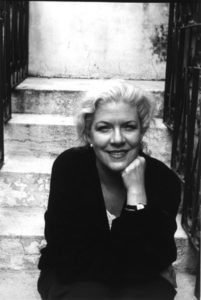
Jennifer Clement, PEN International President 2015-2021
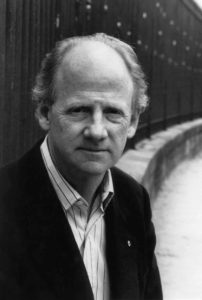
John Ralson Saul, PEN International President 2009-2015
Jiří’s successor John Ralston Saul, former President of PEN Canada, had been a long time PEN member, active in the organization with experience in governing. He took on a much more active role as President, working with International Secretary Eugene Schoulgin (Norwegian PEN) and then International Secretary Hori Takeaki (Japan PEN). John traveled the globe visiting PEN centers and government officials and taking on the issues of his period. After John, PEN elected its first woman President Jennifer Clement, former President of PEN Mexico, who took on the work, along with a special focus on the issues of women globally. She spearheaded, along with PEN’s Women Writers Committee, a Women’s Manifesto and later an Imagination Manifesto and will serve until the end of the Centenary Congress in England in 2021. Kätlin Kaldmaa (Estonian PEN) has served as International Secretary during this time along with longtime PEN member Carles Torner as Executive Director.
Unfortunately over the years as PEN’s website has been upgraded, the content has not always been exported so many of the documents and speeches and records have not followed into the digital universe. The narrative is carried in paper files which overflow in my basement and even more in PEN’s and in the memories of PEN members. My own PEN Journey has been an effort to record some of the history and offer a continuity of narrative during a particular period, through the eyes of one PEN member who has had the privilege and pleasure of standing up close for part of that history. I’ve tried to render the direction and actions. The flaws, the missteps of people, including myself, I’ve also witnessed but have largely left to the side in this narrative. My purpose has not been to be a critic nor a hagiographer, nor a novelist, but a reporter, recording the actions and the journey with a touch of personal memoir.
I will leave this journey by quoting from PEN’s Democracy of the Imagination Manifesto, unanimously passed at the 85th PEN World Congress in Manila, Philippines, October 2019:
The opening of the PEN International Charter states that literature knows no frontiers. This speaks to both real and, no less importantly, those imagined.
PEN stands against notions of national and cultural purity that seek to stop people from listening, reading and learning from each other. One of the most treacherous forms of censorship is self-censorship —where walls are built around the imagination and often raised from fear of attack.
PEN believes the imagination allows writers and readers to transcend their own place in the world to include the ideas of others. This place for some writers has been prison where the imagination has meant interior freedom and, often, survival.
The imagination is the territory of all discovery as ideas come into being as one creates them. It is often in the confluence of contradiction, found in metaphor and simile, where the most profound human experiences reside.
For almost 100 years PEN has stood for freedom of expression. PEN also stands for, and believes in, the freedom of the empathetic imagination while recognizing that many have not been the ones to tell their own stories.
PEN INTERNATIONAL UPHOLDS THE FOLLOWING PRINCIPLES:
- We defend the imagination and believe it to be as free as dreams.
- We recognize and seek to counter the limits faced by so many in telling their own stories.
- We believe the imagination accesses all human experience, and reject restrictions of time, place, or origin.
- We know attempts to control the imagination may lead to xenophobia, hatred and division.
- Literature crosses all real and imagined frontiers and is always in the realm of the universal.
Next and final installment of PEN Journey: Introduction—the Curtain Rises
Links below are to blog posts mentioning PEN after 2007. I was not writing official reports of Congresses or WiPC conferences or other events, but reflecting on PEN’s work, cases and the impact of ideas in my own monthly posts, some of which I used in writing this PEN Journey:
The Journey of Liu Xiaobo: From Dark Horse to Nobel Laureate
March 31, 2020
Arc of History Bending Toward Justice?
March 20, 2019
Gathering in Istanbul for Freedom of Expression
May 23, 2018
Women’s Voices Rising (Women’s Manifesto)
February 28, 2018
Liu Xiaobo: On the Front Line of Ideas
December 7, 2017
Reclaiming Truth In Times Of Propaganda (83rd PEN Congress in Lviv, Ukraine)
September 28, 2017
“Finding Room for Common Ground: No Enemies, No Hatred”
September 8, 2017
In Turkey, a show of solidarity with writers behind bars (PEN Turkey Mission)
February 3, 2017
Power on Loan
January 23, 2017
Hope for Songs Not Prison in 2017
December 27, 2016
Building Literary Bridges: Past and Present (82nd PEN Congress in Ourense, Spain)
October 3, 2016
Call for Help inside Iran’s Evin Prison
May 23, 2016
Spring and Release
March 18, 2016
View on the Bosporus: Rights in Retreat
January 29, 2016
Democracy in Africa: Who Can Chat with Kabila?
November 30, 2015
Life instead of Death…Rationality instead of Ignorance (81st PEN Congress in Quebec, Canada)
October 23, 2015
What Are You Not Reading This Summer? (WiPC Conference in Amsterdam)
June 11, 2015
Times and Tides
November 14, 2014
PEN on the Plains of Central Asia (80th PEN Congress in Bishkek, Kyrgyzstan)
October 7, 2014
Poets, Pardons and Ramadan
August 2, 2014
Women’s Progress: The Power of a Bridge…and a Double Yellow Line
March 12, 2014
Qatar: A Poet in a Desert Cell
November 1, 2013
The Last Colony?
October 15, 2013
Parallel Universe in a Glassed Concert Hall in Iceland (79th PEN Congress in Reykjavik, Iceland)
September 16, 2013
Living In and Beyond History (WiPC Conference in Krakow, Poland)
May 20, 2013
Two Voices Behind the Iron Doors
April 8, 2013
North Korean Writers in a Land of the Rising Sun (78th PEN Congress in Gyeongju, South Korea)
September 15, 2012
facebook or not?
June 28, 2012
Voices Around the World
January 30, 2012
Bridge Over the Bosporus: Citizenship on the Rise (77th PEN Congress, Belgrade, Serbia mentioned)
September 28, 2011
Tourist in Beijing: A Dance with the Censor
July 29, 2011
Ice Flows: Freedom of Expression
January 29, 2011
In the Woods: On History’s Doorstep
December 22, 2010
Full Moon Over Tokyo (76th PEN Congress in Tokyo, Japan)
September 30, 2010
Introducing Isabel Allende
May 21, 2010
“Because Writers Speak Their Minds”–2
March 31, 2010
“Because Writers Speak Their Minds”
February 24, 2010
Haitian Farewell
January 18, 2010
Yellow Geranium in a Tin Can
October 27, 2009
China at 60–Fate of Liu Xiaobo?
September 30, 2009
A Time of Hopening (WiPC Conference in Oslo, Norway)
June 24, 2009
“There Will Still Be Light” *
April 30, 2009
The Intensifying Battle Over Internet Freedom
February 24, 2009
Charter 08: Decade of the Citizen
December 30, 2008
China from the 22nd Floor (Hong Kong Conference)
May 28, 2008
OLYMPIC RELAY– A POEM ON THE MOVE
April 21, 2008
Words That Matter
March 4, 2008
PEN Journey 30: Barcelona: A Surprise
PEN International celebrates its Centenary in 2021. I’ve been active in PEN for more than 30 years in various positions and now as an International Vice President Emeritus. With memories stirring and file drawers of documents and correspondence bulging, I am a bit of a walking archive and have been asked by PEN International to write down memories. I hope this personal PEN journey will be of interest.
I was having lunch with my husband at a Georgetown restaurant in Washington, DC on a Saturday in May, 2004. I was due to fly out the next day for Barcelona to attend International PEN Writers in Prison Committee’s 5th biennial conference, part of a larger Cultural Forum Barcelona 2004. My husband and I were talking about our sons—the oldest was getting a PhD in mathematics and was also training for the 2004 Olympics as a wrestler, hoping to make the British team. (He had dual citizenship.) The younger, recently graduated with an advanced degree in International Relations, had just deployed to Iraq as a Marine 2nd Lieutenant and was heading into a region where the war was over but the insurgency had begun. It was an intense time for our family, yet as parents there was not much we could do except to be there, cheering for our oldest at his competitions and writing letters and sending packages and prayers for our youngest. It was a time when as parents we realized our children had grown beyond us and were taking the world on their own terms.
I was planning to be away for the week in Barcelona where PEN members from around the world were gathering for the Writers in Prison Committee (WiPC) and Exile Network meetings. Carles Torner, PEN International board member, chair of PEN’s Translation and Linguistic Rights Committee and former President of Catalan PEN, had helped arrange International PEN’s participation and funding as part of the Universal Forum of Cultures—Barcelona 2004. This would be the largest WiPC conference to date with delegates from every continent and multiple speakers and side events.
Carles, a poet, fluent in PEN’s three official languages English, French and Spanish, was one of the highly respected, organized and talented PEN members. He’d also been involved in the years’ long reformation of PEN International. As members looked to who could be a strong replacement for the current International Secretary when Terry Carlbom’s term ended in a few months, there was widespread enthusiasm for Carles to stand for the office. I was among the enthusiasts.
My phone rang at that Saturday lunch. International PEN Board member Eric Lax, already in Barcelona for meetings, said he had news and a question; he told me he was calling on behalf of others as well. The news: the Catalan government had also recognized Carles’ talents and had offered him a position as Director of Literature and Humanities Division at Institut Ramon Llull to promote Catalan literature abroad. A father of three, Carles had accepted this paid position which meant he couldn’t stand for PEN International Secretary, an unpaid position. He wouldn’t have the time for both, and there would be conflicts of interest.
Eric asked if I would allow myself to be nominated. A number of members and centers, including the two American centers, were asking, he said. PEN’s Congress where the election would take place was only a few months away in September and nominations were due soon. I was flattered but said no for a number of reasons. Eric asked that I not answer yet, just come to Barcelona, talk with people and let them talk with me.
The International Secretary who worked with the Board and President to run International PEN was not a position I aspired to, but I agreed to come to Barcelona with an open mind. I’d worked with PEN in various roles, including as Chair of the Writers in Prison Committee, for over 20 years. I’d been both inside and outside the reform process that was going on. I understood, at least in part, what PEN was aiming towards and what it would take for this sprawling organization to operate competitively among nongovernmental organizations in the 21st century. I’d sat on boards of several global nonprofit organizations, including Human Rights Watch, Save the Children and the International Crisis Group.
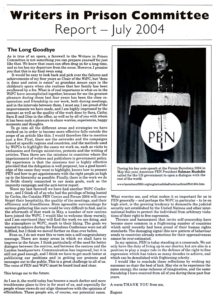
PEN Writers in Prison Committee Center to Center newsletter Spring, 2004
In Barcelona delegates from a number of PEN centers urged me to stand for the office. I asked whether they thought this was the time for an American to take on this leadership role given the controversy over US engagements. “We don’t think of you as American,” some said, perhaps because I’d also lived in Europe for six years during my work with PEN.
I kept my own personal life quiet as I always did, but I did share with Carles, who was urging me to stand, that I had a son in the Marines in Iraq and was committed to him. I didn’t want to get involved in political controversies over the war. “Your focus has always been on freedom of expression,” Carles reminded me. PEN was not an anti-war organization; its focus was on protecting freedom of expression for writers to agree or disagree on issues, not to take political positions unless relating to abuses of human rights.
Mike Roberts, PEN American Center’s Executive Director, was among those encouraging me to stand for the office. He said American PEN would support me however they could with help and advice. We both understood that the organizational models of many American nonprofit organizations could benefit PEN, including the need to have a paid executive director. There was much to be said for the culture of the volunteer which PEN operated in, but given how complex and widespread PEN’s work had grown, it was going to be more and more difficult to compete for funding if there was not a paid professional executive director in the international office in addition to the talented administrative staff and Board of PEN. Certain funders were already telling us as much. Case in point was that Carles, an experienced literary organizer with a family to support, simply could not afford to take on such a demanding position gratis. Eugene Schoulgin, chair of the Writers in Prison Committee, also encouraged me. I left Barcelona thinking deeply about standing for this position which would require significant time and travel.
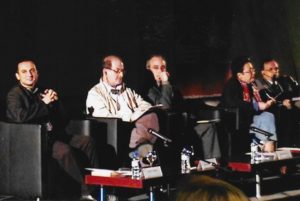
PEN Program at Cultural Forum Barcelona 2004. L to R: Carles Torner, International PEN Board Member and director for PEN conference, Salman Rushdie, President American PEN, Josep Bargalló, First Minister of Catalonia, Dolors Olier, President Catalan PEN
That question absorbs many of my personal memories about the Barcelona conference. I remember the impressive venue and the conversations with friends and colleagues and the many presentations, including by Anna Politkovskaya and an opening talk by Salman Rushdie, the new President of American PEN who called for the US government to open a wider dialogue with the world.
Fortunately, I have papers from the 2004 Writers in Prison Committee meetings. We met over five days and also joined public discussions on literature and memory and the responsibility of writers during times of war. The WiPC continued its focus on issues of impunity and the effect of anti-terror legislation on free expression as documented in PEN International’s two reports issued the previous year.
Joan Smith of English PEN reported that anti-terror legislation was having an impact with democratic countries reacting out of fear to the events of September 11 and either tightening existing legislation or implementing new legislation. Countries such as Cuba were taking advantage for as attention deflected from them, they were cracking down on more dissidents. Countries such as Uzbekistan and other Central Asian countries were using the war against terrorism to win support from the US and western Europe.
Müge Sökmen of Turkish PEN spoke of the danger of silencing dissident voices, a move that would lead to an increase in state terrorism. Since the 9/11 attacks in the US there had been a 20% increase in the number of imprisoned writers. The lifting of Article 8 of the Turkish Anti-Terror Law was welcomed but was in the context of Turkey’s bid for acceptance into the European Union.
Ragip Zarakolu, a Turkish publisher, and Martxelo Otamendi, director of a Basque newspaper, reported to the meeting on their experiences of repression and imprisonment under the anti-terror laws.
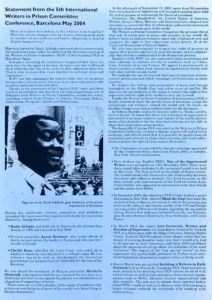
Report on 5th International PEN Writers in Prison Committee Conference as part of Barcelona Forum 2004, including preliminary meetings in London, New York, Istanbul and Ottawa.
Nigerian writer and journalist Kunle Ajibade, who had been sentenced to life imprisonment in 1995 for “conspiring to overthrow the government,” had been freed in 1998 in part because of PEN’s work. But he told the group, “Many of us have been asking, is this what we went to jail for? What has all our struggle come to? A mere clearing of the path for another set of murderers and looters? Right now, a cloud of despair hangs over us.”
Ali Lmrabet, Moroccan journalist, who had been sentenced to three years for insulting the King, also spoke. However, Cheikh Kone, a journalist from the Ivory Coast who’d fled to Australia, had been denied a visa to Spain and so an empty chair was placed at the speaker’s table. Kone had been detained since 2001 in a refugee camp in Australia and was finally released in July 2003 after PEN’s campaign, but the Australian government had invoiced him for $89,000 for the cost of his detention.
Aaron Berhane, an Eritrean journalist who fled to Canada in 2002 reported his situation and the help International PEN’s WiPC and Canadian PEN had given through the Writers in Exile Network. The Network, started in 1994, was currently chaired by PEN Canada and included PEN centers in Austria, Switzerland, Sweden, Norway, England, USA West, and Germany and had helped exiles from Cuba, Sierra Leone and other countries.
A panel with representatives from OSCE, UNESCO, the UN Human Rights Commission, the International Publishers Association (IPA), and the International Freedom of Expression Exchange (IFEX) gathered with PEN to explore cooperation and joint work around issues of freedom of the media, including campaigns on individual cases and pressure on countries to change their laws to conform to democratic standards.
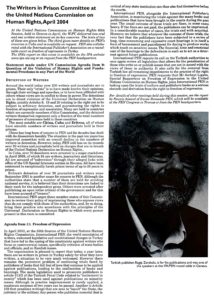
Report on PEN Writers in Prison Committee statement to UN Commission of Human Rights, April, 2004
Ambeyi Ligabo, Rapporteur on Freedom of Expression in the office of the UN Commissioner on Human Rights said he believed the two new threats to freedom and liberty were terrorism and anti-terrorism legislation. He was concerned that countries such as Denmark which professed to be a beacon of democracy were actually denying liberties to their citizens. He was concerned that legislation introduced in some African countries had undermined the progress human rights campaigners had achieved, and he urged collaborative efforts in fighting new threats to free expression.
The WiPC Steering Committee, which consisted of representatives from ten PEN centers, presented its report with suggestions for WiPC headquarters and for the PEN centers on how to expand PEN’s work, its outreach, its funding and its cooperation. A three-year plan was adopted.
The final work of the WIPC conference was an agreement on a campaign calendar for 2004-2005 with an over-arching theme on the issue of Freedom of Expression and Anti-Terrorism.
In accepting PEN’s WiPC statement on freedom of expression from the conference whose theme was “The Value of the Word,” Catalonia’s Minister of Culture declared: “The word is an inspiration for the imagination, a means for peace and a vehicle for freedom. Literature and the word must always be above conflict. PEN has been in the forefront in the fight to secure the value of the word. The value of the word is a guarantee for a better world and more necessary than ever.”
It was agreed the next WiPC Conference would be held in Istanbul in 2006, hosted by Turkish PEN.

La Sagrada Familia—Gaudi Cathedral—in Barcelona, Spain
Before I left Barcelona, I went to visit the Gaudi Cathedral (La Sagrada Familia) which I’d first seen at PEN’s 1992 Barcelona Congress where I’d been so impressed by its majesty and complexity, I wanted to return. Architect Antoni Gaudi had originally planned a cathedral with 18 Gothic spires, but he got hit and killed by a trolley before his elaborate design was realized. Over 100 years later, the cathedral was still unfinished. Gaudi had applied for a construction permit in 1885 but no one ever answered. (It took the city 137 years before a building permit was finally issued in 2019, along with a $5.2 million fee.)
Gaudi defined architecture as the “ordering of light” so that the sun shined differently on the cathedral stones at each moment of the day, producing the myriad effects of light. In the intervening years others had worked to complete Gaudi’s design, but the cathedral remained unfinished. It was nonetheless a magnificent architectural achievement, a harmony or even disharmony of hundreds/thousands of artisans over the century who created this living work of art. I stood in an open space and stared up at the sky.
Next Installment: PEN Journey 31: Tromsø, Norway: Northern Lights
PEN Journey 25: War and More War: Retreat to London
PEN International celebrates its Centenary in 2021. I’ve been active in PEN for more than 30 years in various positions and now as an International Vice President Emeritus. With memories stirring and file drawers of documents and correspondence bulging, I am a bit of a walking archive and have been asked by PEN International to write down memories. I hope this personal PEN journey will be of interest.
“Whenever and wherever writers band together, whenever and wherever the members of PEN gather, regionally or nationally, there seems to be an emergency on our agenda…” So German novelist Günter Grass opened the 67th PEN Congress in Moscow in 2000. Grass was referring to the crisis in Chechnya at the time, but his observation held true the following year as PEN hastily arranged a replacement Assembly of Delegates in London, November 2001.
Two months earlier the United States had been attacked on September 11. A month later a U.S.-led NATO coalition invaded Afghanistan. But the conflict which upended PEN’s plans stirred in the Balkans with an impending civil war in Macedonia.
PEN’s 2001 Congress was originally to have taken place in the Philippines, but funding fell through. (Philippine PEN finally hosted a Congress in 2019.) Macedonian PEN agreed to move its 2002 Congress ahead a year and host PEN in the ancient city of Ohrid, but the Albanian National Liberation Army attacked Macedonian security forces in February 2001. As fighting escalated, PEN was again faced with the dilemma of whether to hold a Congress in a country in conflict.
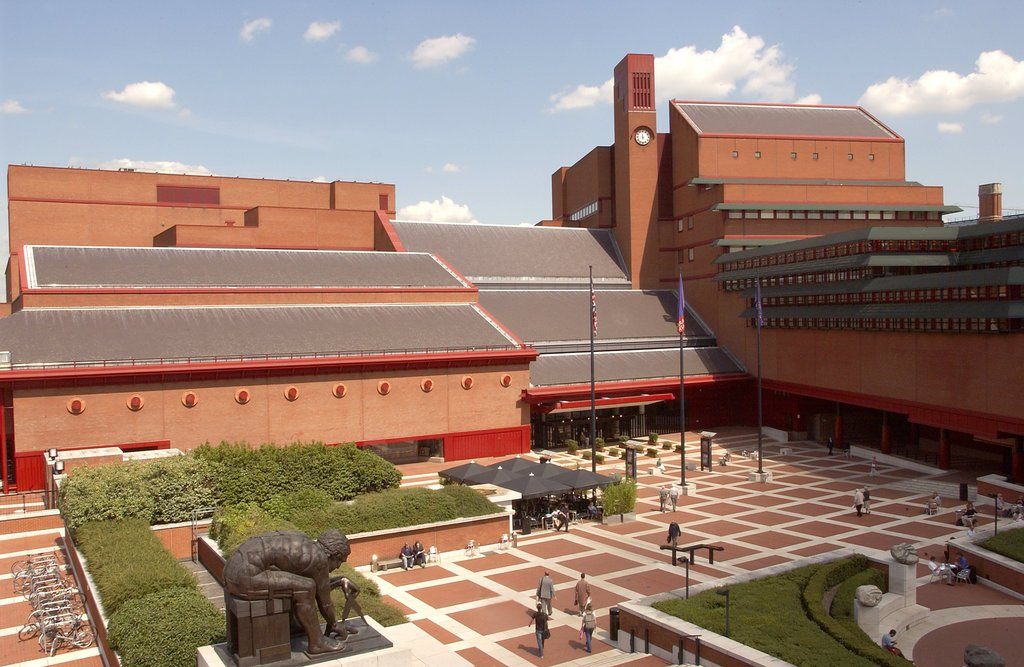
English PEN hosted an opening reception at the British Library for PEN International’s replacement Assembly of Delegates, November 2001
Finally, in August given the political situation in Macedonia, which was close to civil war, PEN’s Executive Committee “against the advice of the International Secretary” but “united in trying to overcome the situation,” decided to cancel the Macedonian Congress. Instead PEN planned a three-day replacement Assembly of Delegates in London where the business of PEN and its committees would take place but without all the literary and social events that usually accompanied a Congress. Delegates who arrived early could attend English PEN’s Day of the Imprisoned Writer service at St. Brides on Fleet Street, and English PEN hosted an opening reception and literary evening at the British Library; another reception at Lancaster House was hastily arranged, hosted by the Parliamentary Undersecretary of State for Foreign and Commonwealth Affairs. Ten years earlier a similar replacement Assembly had taken place in Paris when the Congress had been canceled in Delphi because of finances and the start of the Balkan War. (PEN Journey 7)
In September, “alarmed by the escalating volatility of the situation,” International Secretary Terry Carlbom sent a letter to PEN’s Vice Presidents announcing the change and asking for support. That letter was dated September 11, 2001.

November 2001 near Ground Zero in New York City after the 9/11 attacks. People remembering those lost and workers still clearing wreckage.
On September 11, I was in New York City. I had just flown in the night before from an International Crisis Group board meeting in Brussels to attend meetings at Human Rights Watch. That morning I was dressing and watching the news when, like millions of Americans, I saw the first plane fly into the World Trade Center. I assumed it was a terrible accident when suddenly live on tv I saw the second plane crash into the South Tower….
Phone lines quickly jammed. I couldn’t imagine my meetings would take place, but when I couldn’t get through, I left the hotel and began walking down Fifth Avenue towards the Empire State Building where Human Rights Watch had its offices. But as I headed downtown, the streets filled with people rushing uptown. New York City was closing, with no traffic allowed in or out. I found myself locked down in Manhattan. Most Americans can tell you where they were that day and what happened next.
Two months later I flew back to Europe for the PEN Assembly of Delegates, held in Russell Square in Bloomsbury at a cost-efficient hotel, rather stark if I recall, but functional and accommodating to the over 160 people who made their way from 65 PEN Centers around the world, delegates from every continent.
It was PEN’s 80th Anniversary. The initial meeting of PEN in 1921 with its first president John Galsworthy, PEN founder Catherine Amy Dawson Scott and others had been held in Bedford Square, not far from where we were meeting. PEN clubs had rapidly sprung up in Europe—in France, Sweden and elsewhere—and in the United States. By the Assembly in 2001 PEN had more than12,000 members in 131 centers in over 100 countries.
PEN was born in the upheavals of world history, observed International PEN President Homero Aridjis at the opening of the 2001 Assembly. “What should be the role of writers and PEN in the aftermath of 9/11?” he asked and answered that PEN should continue to ensure the role of writers and be alert to those who would try to sacrifice personal freedom and the rights of minority populations. It was important that democratic practices survive and that PEN remain vigorous in the defense of freedom.
In a resolution passed by the Assembly of Delegates, PEN recognized “the urgent threat to freedom represented by the terrorist attacks of September 11. It also recognized the aims of terrorism are incompatible with democratic values, including freedom of expression.” But the resolution also addressed the concern that “the emergency measures adopted by governments to combat ‘terrorism’ should not further endanger those values and the essential human rights that derive from them.” In the resolution passed, PEN “expressed its concern that legislation and executive orders currently being planned or already passed by the governments of the United Kingdom, the United States, Canada, Denmark, Japan and other countries may place unacceptable restrictions on these rights. PEN voices its concern that such measures may curtail existing rights of writers and journalists, as protected by Article 19 of the Universal Declaration of Human Rights and other international human rights instruments. The Assembly of Delegates of International PEN urges that the atrocities of September 11 should not be exploited by governments to assume extraordinary and unjustifiable power to curtail free expression.”
The Resolution on post-September 11 events was the first of more than a dozen resolutions passed by the Assembly, resolutions which included protests, actions and appeals regarding freedom of expression and human rights in Bangladesh, China, Cuba, Eritrea, Iran, Israel and Palestine, Mexico, Russia, Syria, Turkey, Uzbekistan, Vietnam, Zimbabwe, and relating to the Kurds.
The Russian delegate thanked PEN for holding the previous Congress in Moscow. “You saw with your eyes what was in Moscow. I want to thank you that you didn’t leave us in this difficult time,” he said. Russian journalist Anna Politkovskaya, who had been covering the war in Chechnya, then addressed the Assembly. She explained that she went to Chechnya in 1999 as a reporter for the only free and independent newspaper still publishing “to witness the crimes and evil by the Russian Army.” Because of recent threats against her by the government, she was advised by her editor to leave Russia, and she now lived in Vienna. “I’m going to remind you of unpleasant things the world has forgotten,” she said. “There is a war in Chechnya. The world doesn’t want to fight against this war. Nobody is counting how many civilians have been killed in the war. Journalists who cover the Chechen war have different figures from 18,000-100,000 people. There is no economy, only a black economy. Now there are practically no journalists who cover it…To me it’s clear it’s an anti-terrorist operation that failed to accomplish its goal, but against this background Putin has become a very important person after September 11…I want to remind you that all new wars are sequels to previous wars.”
After Anna addressed the Assembly, the delegates returned to the ongoing business of reports and resolutions, and Anna met with Writers in Prison Committee members and the WiPC Program Director Sara Whyatt.
Additional resolutions were also passed which approved the adoption of “the Membership Platform Document as a Working Paper of International PEN and as a guideline document governing the creation, organization and work of all PEN Centers.” The document developed in consultation with the centers and the Executive Committee and International Secretary, along with changes in Regulations and Rules of Procedure were part of the ongoing modernization of the organization. At the Assembly, the Executive Committee of PEN was officially renamed the Board of International PEN with an understanding that the translation of the term “Board” still had to be agreed upon by the French and Spanish speaking centers.
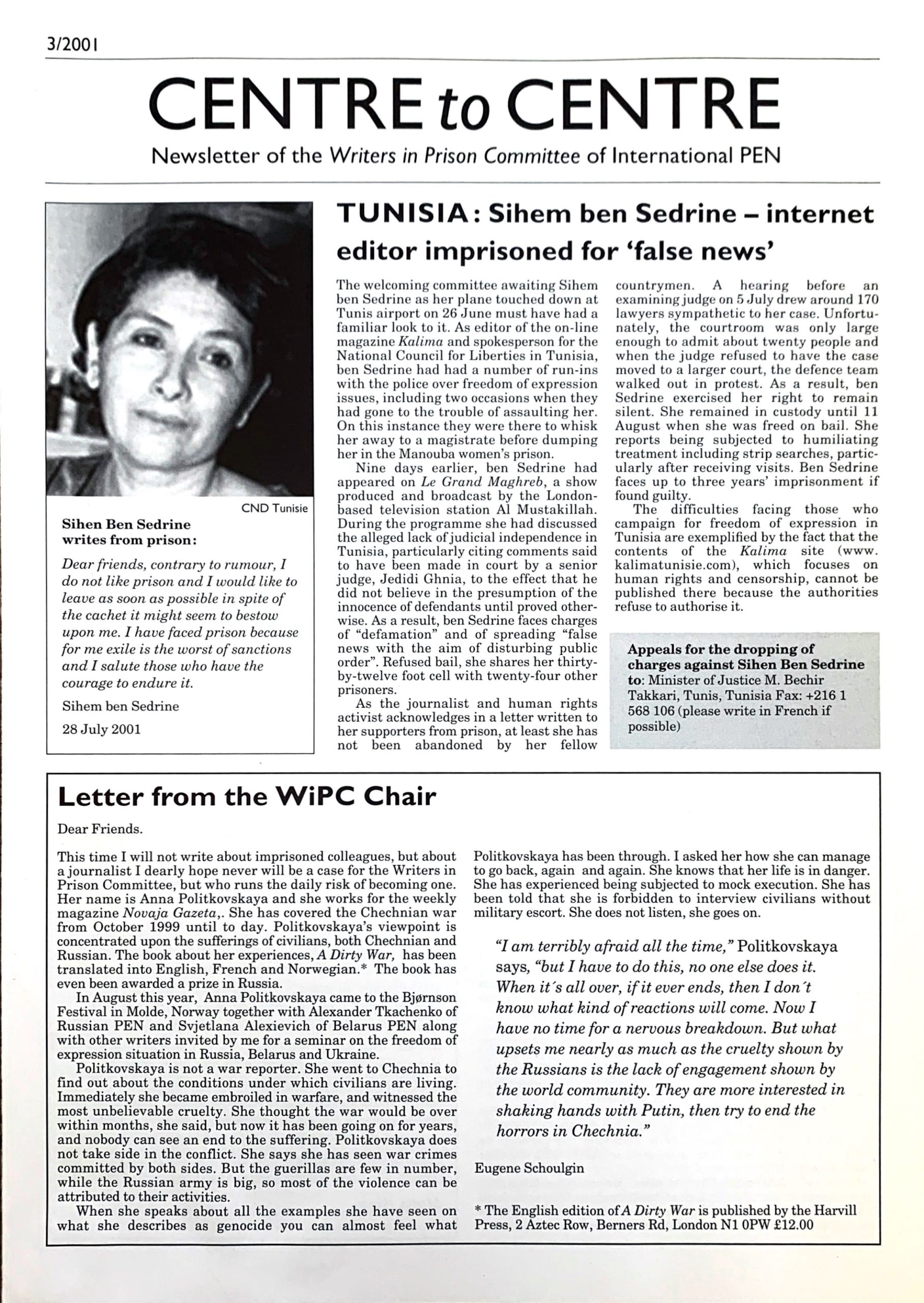
PEN’s Writers in Prison Committee newsletter summer/fall, 2001. The two stories—of Tunisia’s Sihem ben Sedrine and of Russia’s Anna Politkovskaya—would play out on a world stage a few years later.
In a globe where security paradigms had been turned upside down and armies were standing up, PEN’s 2001 Assembly, which had no remit in the area of security except to write about it, focused on the situation of writers around the world. This included the large number of prominent writers who had been freed over the past year after intensive PEN involvement as well as the rise in the number of writers who had been detained.
PEN worked in civil society. At the 2001 Assembly PEN encouraged regional cooperation between centers through networks. Earlier that year a trip through Africa by the International Secretary and African Board member Vincent Magombe had promoted further activity and growth of PEN centers in Africa.
The Assembly also attended to rules and regulations and the development of a strategic plan in the belief that a robust organization could better deliver the programs of International PEN and serve the world’s writers.
Elections gave Terry Carlbom a second term as International Secretary; Britta Junge Pedersen was elected Treasurer; Andrei Bitov and Moris Farhi were elected Vice Presidents, and with thanks to the three retiring Executive Committee members, especially Deputy Vice Chair Marian Botsford Fraser, three new members were elected to PEN’s International Board: Eric Lax (PEN USA West), Judith Roriguez (Melbourne PEN) and Alexander Tkachenko (Russian PEN.) Four new Centers were also voted into PEN: Algerian Center, Independent Chinese Writers Center, Nigerian Center and Ugandan Center.
PEN’s role at that time was perhaps best summed up earlier that year in an address by former International PEN President Arthur Miller at an American PEN event. He said, “That PEN is still around after three quarters of a century when it has no army, no navy or air force, no political rewards or threats of punishment, is possibly a triumph of illusion over reality, the illusion that hope is rational in this world.”
Next Installment: PEN Journey 26: Macedonia—Old and New Millennium
PEN Journey 5: PEN in London, Early 1990’s
PEN International celebrates its Centenary in 2021. I’ve been active in PEN for more than 30 years in various positions and now as an International Vice President Emeritus. With memories stirring and file drawers of documents and correspondence bulging, I am a walking archive and have been asked by PEN International to write down memories. I hope this personal PEN journey might be of interest.
I moved to London where International PEN is headquartered in January 1990 from Los Angeles. I came with my husband and my 9 and 11-year old sons who rarely wore long sleeves, let alone coats or jackets. A few weeks into our resettlement, London spun in its first major tornado of the decade with hail and winds whipping at hurricane force and cars and trees toppled and a few rooftops airborne. The weather was highly unusual for London. Our family, who was still in temporary housing, took the unwelcome weather as a welcome of sorts, signaling that we might just be in for an adventure. Did you see that roof flying…!
There were still complaints: only four television channels, movies strictly restricted by age and when you did get into a theater, you had assigned seats, milk that went bad in a day, delivered on the stoop in glass bottles, a refrigerator that barely held enough food for a day, appliances that came without plugs…And where was the sun?
Yet the magic of the city quickly affected us all. My youngest son discovered the best skateboarders lived in London, and London (and England) was full of history and castles, and my oldest son, who was soon moved ahead a grade in school because he was highly talented in math, met students from all over the world in his class at the American School, a few of whom talked and imagined in his orbit. He was put on the rugby team to help socialize and the following year on the wrestling team, where he eventually, as an adult and by then dual citizen, wrestled for Great Britain in the Olympics.
For me, finding home in London meant connecting with PEN, both International PEN and English PEN. Writers can be members of more than one PEN center, though can vote with only one center. I’d begun my PEN journey in Los Angeles at PEN Los Angeles Center (changed to PEN USA West). When my second book was published, I also joined PEN American Center, based in New York, and now in London. I joined English PEN, the oldest and the original PEN center since the organization was founded by British writers in 1921. International PEN and English PEN had separate offices, but the Administrative Secretary of International PEN and the General Secretary of English PEN were longtime friends and actually lived next door to each other in Fulham. The two organizations worked independently, yet closely together.
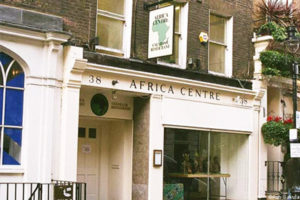
Early on I visited International PEN’s office, headquartered in Covent Garden on King Street in the Africa Centre. To get to the office at the front of the house, you had to go through the Africa Book Shop on the first floor. PEN had two rooms with several desks in the larger room with papers stacked everywhere. There was a filing cabinet and a photocopier and just enough space to squeeze between to get to the desk looking onto the street.
International PEN was kept functioning by the stalwart and efficient Elizabeth Paterson, who I don’t recall getting angry at anyone even as the work piled on and people around the world in PEN centers asked more and more of her, including the smart, demanding International Secretary Alexander Blokh. Alex flew in every month, usually from Paris, and displaced the Writers in Prison Committee’s small staff from the second office in order to conduct the business of PEN around the world. Alex was a former UNESCO official, and at that time UNESCO was one of International PEN’s major funders. When UNESCO was formed, according to Alex, it established organizations for the various arts, but when it came to literature, it recognized that PEN already existed, and so its outreach and funding funneled through PEN. Over the years PEN has grown more and more independent of UNESCO support.
Elizabeth, with her quiet intelligence and subtle humor, managed to keep International PEN running day to day while Alex developed the literary and cultural programs with the centers and the standing committees—the Translation and Linguistic Rights Committee, the Peace Committee, and the Writers in Prison Committee (WiPC). The WiPC tended to operate more autonomously with its elected chair Swedish publisher Thomas von Vegesack and before him Michael Scammell. When I arrived in London, there was also a petite gray-haired woman Kathleen von Simson, a volunteer who’d helped manage the Writers in Prison Committee work for years. PEN had recently hired a paid Coordinator Siobhan Dowd whose task was to professionalize the human rights work, and Siobhan hired researcher Mandy Garner. The two of them worked in the tiny second room. Siobhan eventually crossed the ocean to head up the Freedom to Write program at American PEN.
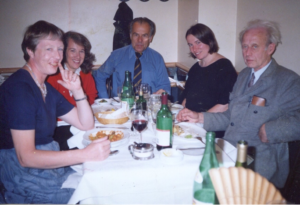
Fall 1990. Left to right: Elizabeth Paterson, Joanne Leedom-Ackerman, Per Wastberg (former PEN International President), Siobhan Dowd, Bill Barazetti
Also finding space on King Street was the Assistant Treasurer (and later International Treasurer) Bill Barazetti, who at that time was an unsung hero from World War II. It was later publicized that Bill had smuggled hundreds of Jewish children out of Prague with false identity papers he arranged. He was a wiry gray-haired former intelligence officer who’d also interrogated captured German pilots. Alex Blokh, whose pen name was Jean Blot, was an exiled Russian Jew, a lawyer and had also been active in the French Resistance during World War II, and Elizabeth had endured the bombings in London during the War. Though it was 1990 and the Berlin Wall and other barriers which had gone up after World War II were now falling, in the PEN office there was still a feeling of that post-War period, an abstemiousness and a fortitude of the dedicated amateur who knew what sacrifice was and endured no matter what. I couldn’t articulate the atmosphere at the time, but as an American born after the war, grown up in Texas and moving to London from Los Angeles, I felt the contrasts and the constraints. One small incident I remember was when a donation for a baby gift for the newly hired Sara Whyatt was being gathered. I offered £20 for the pot and was told by Elizabeth, “Oh, no, that amount would embarrass her.” The concept of anyone being embarrassed by a pooled £20 contribution silenced me. I put in £10 instead, still considered a large amount. Because I was new and an American, I tried to listen and learn, but I understood expectations and horizons were different.
A generation of my own joined the office in the persons of Jane Spender, a former editor, smart and literary who worked with Elizabeth and later Gilly Vincent, who took on the part time assignment to help with development work for the eventual International PEN Foundation. (see PEN Journey 4) Later Gilly became General Secretary of English PEN. I quickly learned to respect the differences; the American way was not the British way. I remember a fundraising event in which there must have been 20 major English writers featured and attending, and the ticket price was £25. The PEN Foundation netted perhaps £3000 that evening. In New York with that line up of writers, I am confident American PEN would have added at least one, if not two, zeros to the proceeds, but we were in London, and the event was not a glittery affair but more like a large family gathering of literary friends at someone’s home.
PEN International moved its offices in 1991 from Covent Garden to Charterhouse Buildings in Clerkenwell nearer the City of London. The new offices were on the top floor of a bonded warehouse, and I never met anyone who didn’t arrive breathless after climbing the steep four or five flights of stairs. There was no elevator, but there was an outside hoist where PEN could load supplies and mail out the window and drop or raise these to and from the ground, preferably not in the rain. Elizabeth set the door code as the beginning and ending years of World Wars I and II, an 8-digit code everyone could remember. The offices at Charterhouse Buildings were spacious compared to King Street—two large airy rooms, one for the Writers in Prison Committee and one for all the other work of PEN, a spacious entry room used as a meeting area and a smaller private office where the International Secretary could work or small meetings could be held. All the rooms were painted “magnolia”–a creamy white/yellow color. The full-time staff by then was, I think, three, along with four or five part-time staff and volunteers, including Jane Spender, Peter Day, editor of PEN International magazine, Bill Barazetti and later his daughter Kathy and occasional interns.
When Siobhan prepared to leave for the U.S., Thomas asked me to interview candidates with him for her replacement. Between interviews he explained to me his view of England in the constellation of Europe by a story of when a fog settled over the English Channel and the headline in a British paper announced: Continent Isolated. Later, when the Channel Tunnel finally connected Great Britain to France in 1994, I sent Thomas a note and a copy of the headline from a British paper: “You’ll be glad to know, Thomas: Continent No Longer Isolated, the headline read.
Thomas and I agreed on the best candidate, and PEN hired Sara Whyatt as the new Program Director of the Writers in Prison Committee. Sara came to PEN from Amnesty and set about further professionalizing WiPC’s research and advocacy work. Sara and Mandy split up the globe, with Mandy focusing on Latin America and Africa.

Across London in Chelsea, English PEN rented offices from the London Sketch Club on Dilke Street where it held weekly literary programs, a monthly formal dinner, an annual Writers Day Program honoring one writer—Arthur Miller, Graham Greene, and Larry McMurtry were three I recall—and a mid-Summer Party. The literary programs and dinners, held in the Sketchers studio and bar, featured writers such as Michael Ignatieff, Germaine Greer, Michael Holroyd, Jan Morris, Rachael Billington, A.L. Barker, Penelope Lively, Andrew Motion, A.S. Byatt, Margaret Foster, William Boyd, Margaret Drabble, Iris Murdoch, and frequently Antonia Fraser, Harold Pinter and Ronald Harwood, just to name a few.
When I moved to London and joined English PEN, the General Secretary Josephine Pullein-Thompson, a stalwart writer/member, managed the organization and kept it running with minimal staff and with active members. Author of young adult novels, Josephine wrote books about young girls and horses. When I close my eyes, I can hear her gruff voice and see her square face and think of horses. She was pragmatic and no-nonsense and what I think of as the epitome of a certain era of British resolve. She befriended me early, I think, because I was focused on a task—getting charitable status for PEN International which ultimately allowed English PEN to claim the same. It was Josephine years later who nominated me as a Vice President of International PEN.
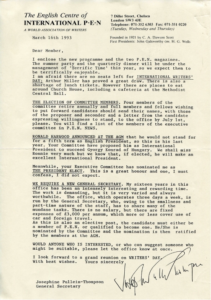
Members of English PEN were passionate about PEN’s mission to protect and speak up on behalf of writers under threat in oppressive regimes. Among activities, members, including notable British writers such as Ronald Harwood, Harold Pinter, and Antonia Fraser, who were good friends, and Moris Farhi, a Turkish/British novelist with a great beard, great girth and great heart, who later succeed me as Writers in Prison Chair, and dozens of other English PEN members held vigils, often by candlelight. They protested outside embassies of countries where writers were in prison. They got press coverage and ultimately helped secure the release of writers, particularly those in former Commonwealth countries like Malawi.
Malawian poet Jack Mapanje recalled his spirit lifting when he saw the press clippings of Harold Pinter and others protesting outside the Malawi Embassy in London on his behalf. When he was released, he resettled in England and joined English PEN.
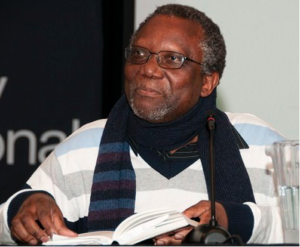
Jack Mapanje
Next Installment: Freedom and Beyond…War on the Horizon